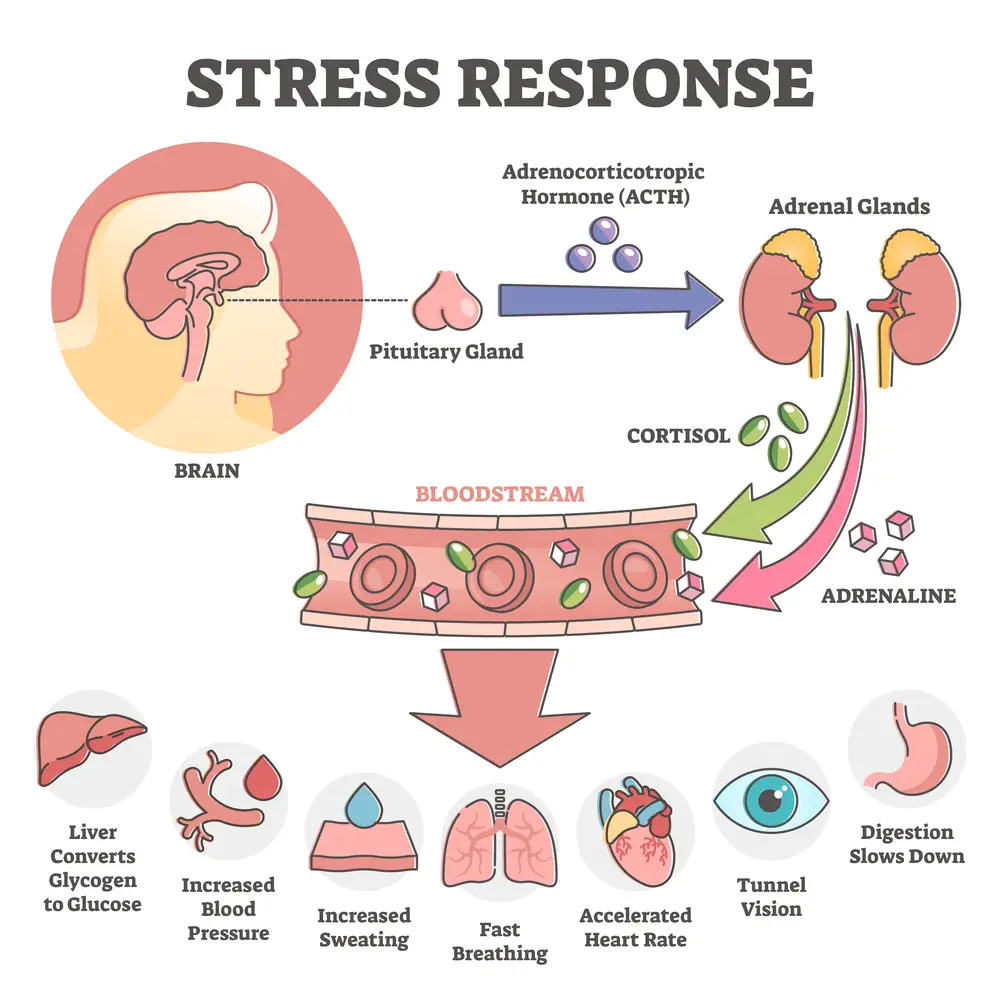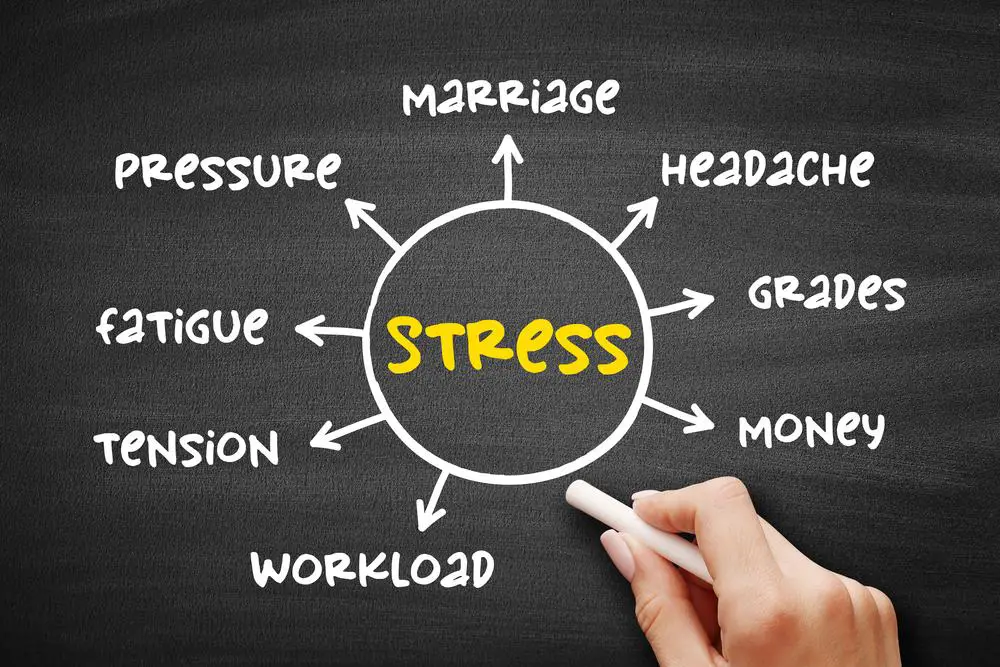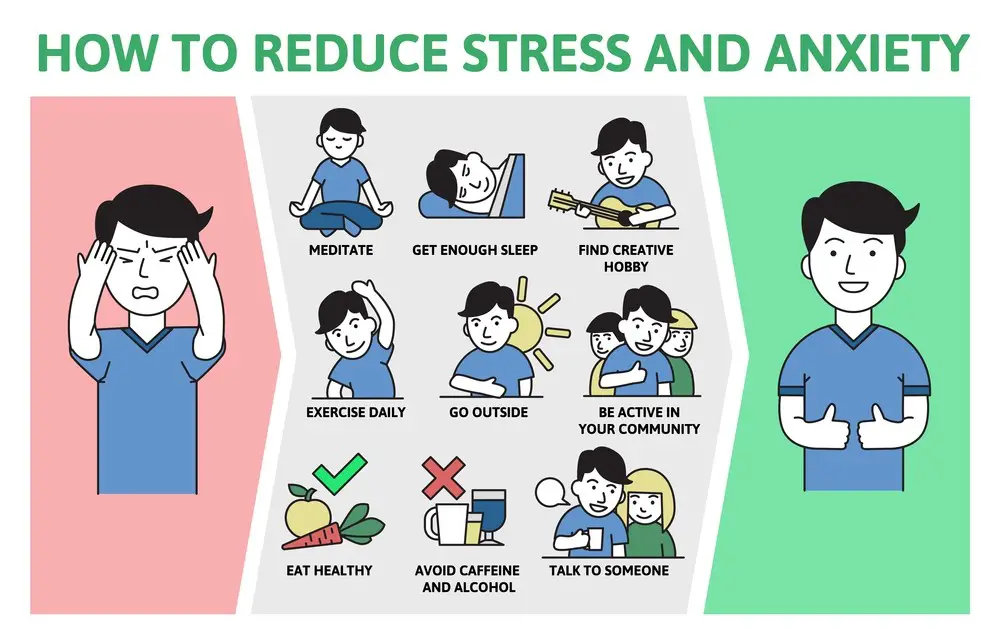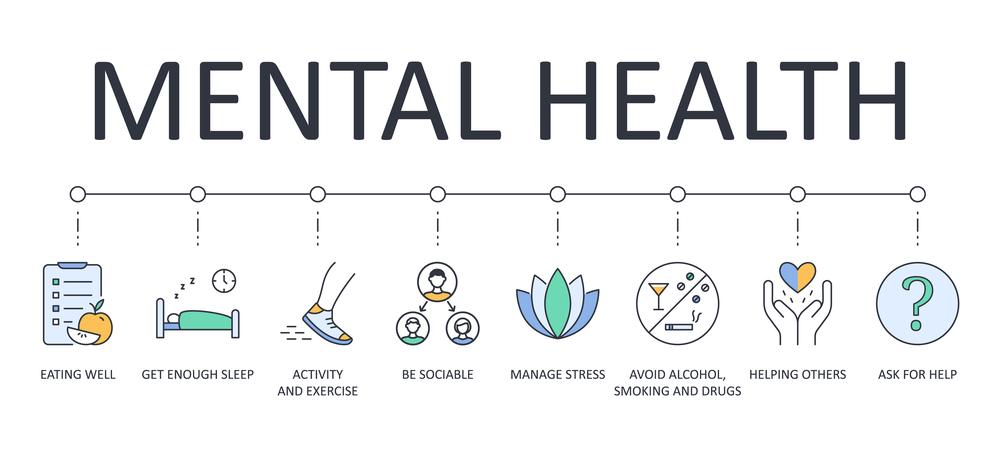As a BetterHelp affiliate, we receive compensation from BetterHelp if you purchase products or services through the links provided
Stress is the body’s response to challenges or demands. Various factors, including work, relationships, financial issues, or significant life changes, can trigger stress. While some stress levels are normal and beneficial in certain situations, chronic or excessive stress can adversely affect your physical and mental health.
The Mayo Clinic reports that stress symptoms vary widely between individuals. They may include physical symptoms like headaches or stomachaches, emotional symptoms like irritability or anxiety, and behavioral symptoms like changes in eating or sleeping habits.
Therefore, can stress make you sick? Yes, the body constantly produces cortisol. The result is reduced white blood cells, which are responsible for helping fight inflammation. Stress also helps create unhealthy habits, affects sleep, and worsens pre-existing conditions.
Stress and its impact on health

Stress can impact health significantly. When considering the question, “Can stress make you sick?” these are some of the ways stress can affect your physical and mental well-being:
Cardiovascular Health – Stress hormones like cortisol and adrenaline can elevate heart rate and blood pressure. Chronic stress can lead to cardiovascular issues.
Immune System – Prolonged stress suppresses the immune system, often leading to infections and illnesses. It also makes it harder for the body to fight pathogens.
Mental Health – Stress contributes to mental health conditions such as anxiety, depression, and insomnia. Chronic stress exacerbates existing conditions.
Digestive System – Stress can affect digestion and exacerbate digestive problems. These include irritable bowel syndrome (IBS), acid reflux, and stomach ulcers. It can also lead to unhealthy eating habits, such as overeating or undereating, which can further impact digestive health.
Weight Management – Stress can affect weight management, leading to weight gain or loss depending on individual responses.
Sleep – Stress can disrupt sleep patterns and contribute to insomnia or poor-quality sleep.
Pain – Stress can worsen chronic pain conditions such as migraines, tension headaches, and muscle tension. It can also lower the pain threshold, meaning you may feel pain more.
Reproductive Health – In both men and women, chronic stress can affect reproductive health by disrupting hormone levels and menstrual cycles, reducing libido, and contributing to fertility issues.
The connection between stress and illness

The production of cortisol, the stress hormone, rises with stress. Dr. Julia Kogan, a health psychologist and neuropsychologist, told Very WellMind that stress affects the immune system, making it difficult for the body to fight infections. The connection between stress and illness is well-established because it decreases immunity, causing frequent illnesses.
When cortisol frequently floods the body, it causes inflammation. Initially, an inflammatory response can help fight off germs and illness. Still, constant stress can create issues with your immune system, causing infections and worsening chronic ailments like arthritis, irritable bowel syndrome (IBS), and fibromyalgia.
With chronic stress, the body’s white blood cells also decrease, and the body becomes less able to ward off infections, making you more prone to colds, the flu, etc.
When stressed, you’re more likely to sleep less. Your immune system weakens when you aren’t sleeping enough or have frequent sleep disruptions.
Another effect of chronic stress is cortisol’s consequences on how the body produces other essential hormones, like the sex hormones estrogen, progesterone, and testosterone. It creates shortages, which can cause problems with menstruation, infertility, fibroids, and endometriosis. Hormone shortages can also cause earlier or more difficult menopause in women and lead to erectile dysfunction in men.
How stress affects your immune system

Can stress make you sick? Yes, it can profoundly impact the immune system, hampering its ability to defend the body against infections and diseases.
When stressed, your body releases cortisol and adrenaline as part of the fight-or-flight response. While these hormones are essential for mobilizing energy and preparing the body to deal with threats, chronic stress can lead to prolonged elevation of cortisol levels, which can suppress the immune system.
Chronic stress can alter the distribution of immune cells in the body. For example, it can increase the number of immune cells in the bloodstream while decreasing the number of immune cells in tissues needed to fight infections.
Stress triggers the release of pro-inflammatory cytokines, signaling molecules that promote inflammation. While inflammation is the body’s natural response to infection or injury, chronic activation of the inflammatory reaction can lead to excessive and harmful inflammation, eventually causing chronic diseases.
Protracted stress can suppress the immune response, making individuals more susceptible to infections and illnesses. Stress hormones inhibit the function of immune cells, such as lymphocytes that play vital roles in recognizing and eradicating pathogens.
Stress can impair wound healing by interfering with immune cell function, leading to delayed wound healing and increasing the risk of complications from injuries or after surgery.
Finally, stress can trigger the reactivation of herpes simplex virus and varicella-zoster virus, both latent viruses. The result is recurrent infections or flare-ups of symptoms.
Physical symptoms of stress overload

Stress overload can manifest in various physical symptoms, varying from person to person. Here are some common physical symptoms associated with excessive stress:
- Tension headaches or migraines
- Muscle tension often felt in the neck, shoulders, and back
- Fatigue or exhaustion, even after adequate rest since stress leads to disrupted sleep
- Gastrointestinal and digestive issues include stomachaches, indigestion, bloating, gas, constipation, IBS, diarrhea, or acid reflux.
- Appetite changes leading to overeating or undereating
- Increased heart rate and blood pressure are caused by amplified adrenaline, placing extra strain on the cardiovascular system, multiplying the risk of heart disease
- A weakened immune system makes you susceptible to infections and illnesses
- Skin problems like acne, eczema, psoriasis, or hives
- Breathing issues like shallow breathing or hyperventilation, leading to shortness of breath, chest tightness, or feeling like you can’t get enough air
- Sexual dysfunction like decreased libido, erectile dysfunction (in men), or difficulty achieving orgasm
Mental health consequences of chronic stress

Chronic stress can have profound effects on mental health, leading to various psychological and emotional consequences. Here are some of the mental health consequences associated with prolonged exposure to stress:
- Chronic stress and persistent feelings of worry are significant risk factors for the development of other anxiety disorders and phobias.
- Prolonged stress can lead to depression, which causes obstinate feelings of sadness, bleakness, and loss of interest or pleasure in activities.
- Exposure to traumatic events accompanied by chronic stress can lead to the development of PTSD. Symptoms include intrusive memories, flashbacks, nightmares, hypervigilance, and avoidance of reminders of a past traumatic event.
- For some, alcohol, drugs, or other substances become a way to cope with chronic stress. Their prolonged use can lead to mental health issues, addiction, dependence, and other negative consequences.
- Chronic stress can impair cognitive function, affecting memory, concentration, and decision-making abilities. It also interferes with executive functions such as problem-solving and planning.
- Stress disrupts sleep patterns and can contribute to insomnia or other sleep disorders, affecting daytime function and aggravating other mental health issues.
- Chronic stress often causes irritability, mood swings, and heightened levels of anger or frustration. Some people struggle to regulate their emotions, causing impulsive reactions to stressors.
- Sometimes, people with chronic stress may withdraw from social interactions and activities they once enjoyed, creating feelings of isolation and loneliness.
- Chronic stress can undermine self-esteem and self-confidence, leading to negative self-perceptions and feelings of worthlessness or inadequacy.
- In severe cases, chronic stress can contribute to the development of suicidal thoughts or behaviors because an individual may feel hopelessness, despair, and overwhelming emotional pain.
Tips for managing stress and staying healthy

Learning healthy coping strategies like practicing stress management techniques and self-care can help alleviate the harmful effects of chronic stress on mental health.
Relaxation Techniques – Learning relaxation techniques (deep breathing exercises, meditation, progressive muscle relaxation, or mindfulness) to practice daily can help reduce stress levels, relax, and promote a sense of calm.
Regular Exercise – Exercise reduces stress and improves mood. A 30-minute exercise routine five days a week is all you need, and it need not be strenuous.
Healthy Diet – Eat a balanced diet packed with vegetables, whole grains, lean proteins, healthy fats, and fruits. Avoid too many processed foods, sugary snacks, and caffeine, all known to increase stress and cause energy fluctuations.
Get Enough Sleep – Make 7-9 hours of quality sleep each night your priority with a regular sleep schedule that includes a relaxing bedtime routine and a conducive sleep environment free of distractions.
Set Realistic Goals – Prioritize tasks, plan manageable steps, and set realistic goals for yourself. Use time management techniques to ensure you don’t feel overwhelmed.
Establish Boundaries – Learn to say no to work, personal, and social commitments or activities that add unnecessary stress to your life.
Maintain Social Connections – Social interactions with friends, family, and supportive individuals allow you to share experiences, and they provide emotional support, helping reduce feelings of isolation and loneliness.
Hobbies and Activities – Make time for hobbies or other activities that make you feel happy and relaxed to help distract you from stressors and boost your mood.
Seek Professional Support—Don’t hesitate to seek help from people who care, like family and friends or a mental health professional, especially when feeling overwhelmed or struggling to cope with stress.
Seeking professional help for stress-related illness

Seeking professional help for stress-related illnesses is a proactive and effective step toward managing your well-being.
Look for a licensed mental health professional, such as a psychologist, psychiatrist, counselor, or therapist, specializing in stress management and related issues. These are easy to find online or by asking others for recommendations. You could ask friends, family, or your physician for referrals.
During your first appointment, your therapist will want to discuss your concerns and symptoms. After assessing your needs, the therapist will create a personalized treatment plan. A mental health professional provides non-judgemental support, so be open and honest.
Treatment options depend on your needs and preferences. These include cognitive-behavioral therapy, mindfulness-based therapy, medication, lifestyle changes, or a combination of approaches.
Commit to attending scheduled appointments and actively participating in your treatment plan. Be consistent with any prescribed medications, therapy exercises, or lifestyle changes recommended by your mental health professional.
Lifestyle changes to reduce stress and improve well-being

Therefore, the answer to the question, “Can Stress Make You Sick?” is yes. Making routine changes to your lifestyle to reduce stress and improve your well-being can significantly impact your overall health and quality of life.
Start by making self-care a priority. Plan time for activities that promote relaxation and enjoyment, like practicing mindfulness or meditation, taking leisurely walks in nature, and indulging in hobbies or creative pursuits.
Remember to get regular exercise, eat healthily, and prioritize quality sleep. Cultivate your relationships with family, friends, and community members. These social interactions help boost your mood and well-being.
Remember to start your lifestyle changes with small, manageable steps and gradually build them over time. Caring for yourself is essential for your physical and psychological well-being. If you’re struggling to manage stress or implement lifestyle changes on your own, don’t hesitate to see a mental health professional
- Stress Management: What is the Relationship Between Stress and Addiction? - June 28, 2024
- Exploring Techniques to Maintain a Healthy Lifestyle without Drugs - May 28, 2024
- How Acupuncture Helps Treat Chronic Fatigue Syndrome - May 28, 2024
This site contains affiliate links to products. We will receive a commission for purchases made through these links.







